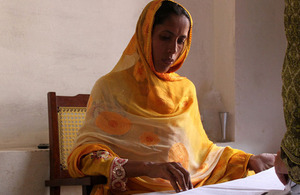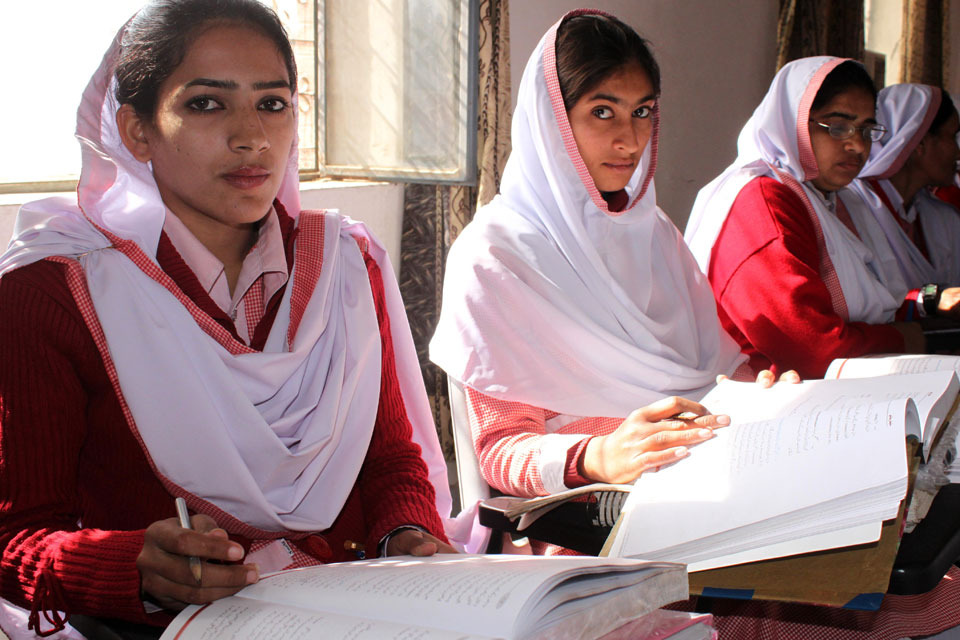Pakistan: a safe delivery
Community midwives trained with support from the UK are helping mothers to give birth safely and care for their newborns.

Kulsoom Zara, a community midwife helps women in her village through their pregnancy and childbirth. Picture: Victoria Francis/DFID
Kulsoom Zara, 28, from the village of Ali Pur Chatta in northern Punjab is a community midwife, trained by the government of Pakistan with support from the UK’s Department for International Development. She helps women from her community through their pregnancy and childbirth from her one-room clinic. In a country where the majority of women give birth at home without skilled birth attendants, Kulsoom’s skills are desperately needed.
Improving life chances for mums and babies
The UK is supporting the Pakistan government to train and deploy 12,000 community midwives (CMW) by 2015 – over 6,000 of whom are already working in the field – to prevent thousands of women dying in childbirth. The UK has also helped build 86 midwife training centres since 2009.
Pakistan has the fourth highest number of deaths from childbirth in the world, with 352,000 children under the age of 5 dying every year. Kulsoom’s own mother died of complications during her pregnancy.
“My mother died because there were no proper health facilities near our village and no one could give us any advice. My father worked really hard to raise us, along with strong support from my family. Although he didn’t have any formal education he always encouraged and supported us to continue our studies.”
And Kulsoom did not disappoint. She completed her matric, followed by a 4-year Diploma in Homeopathic Medical Systems (DHMS).

Community mid-wives in training. The UK has helped to build 86 midwife training centres since 2009. Picture: Victoria Francis/DFID
A calling to the medical profession
“I was always drawn to medicine – especially towards improving care for mothers and babies since I lost my mother and aunt because of lack of skilled help. But I couldn’t afford to study further because we didn’t have the money. That was when I heard about the community midwife training programme – and I jumped at the opportunity.”
Kulsoom completed an 18-month training course at the CMW School in Gujranwala and was 1 of the top-performing students in her class. After the course she became a community midwife for her village.
“The training was quite intensive and taught us how to care for women and their children and help reduce deaths during pregnancy and childbirth. By working in the community I can refer women to the right professional or give them advice, this is very important in villages like ours where the nearest health facilities are 10-15 km away.”
Through UK support, CMW’s are paid Rs 3,500 (approx. £21) per month during their training. For their initial 2 years of deployment they receive a stipend of Rs 2,000 (approx. £12) per month to supplement income they generate through their clinics.
Starting small
“When I started, the response wasn’t great. People were apprehensive because they thought I was still studying and didn’t know enough – even though I had lived in the village my whole life. I had to go from house to house to introduce myself and tell them that I could help them – then people started coming to me.”
Kulsoom began working from home and later moved to a small room built through the UK’s support with essential equipment, medicines and supplies required to assist births. With this support she can treat women both in their homes and at her clinic. She has also built up links with local female health workers – some of whom are from her village – for more complicated cases.
“I help on average 5 women deliver their babies safely each month and most of them visit me regularly during the course of their pregnancy. Others get their check-ups done here, but prefer to go to rural health units or private hospitals for delivery.”
Kulsoom earns enough in a month to re-stock the medicines and keep her clinic running and she enjoys her work.
“Some of the women can’t afford to pay me at all while others might pay Rs 500-1,000 - but it makes me happy to be able to help them at such a crucial time in their lives - to see them through it and see their children live healthy lives.”
Facts and stats
By 2015, the UK will:
- enable 500,000 couples to access contraceptives and so choose when and how many children to have
- prevent 3,600 mothers dying in childbirth by increasing skilled attendants (doctors, nurses, lady health visitors, and midwives) for 1 million births
- save the lives of 120,000 children, including 44,000 new-borns, by expanding basic health services with a focus on family planning, nutrition, and healthcare for women and children
- prevent half a million children becoming undernourished in the Punjab and Khyber Pakhtunkhwa